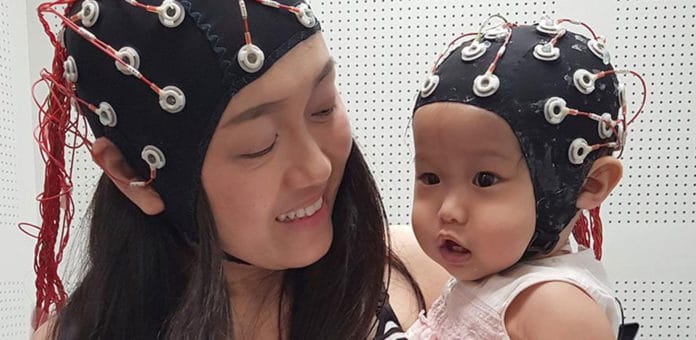Emotional communication between parents and children is crucial during early life, yet little is known about its neural underpinnings. A new study by the University of Cambridge– determined how positive and negative emotions modulate the interpersonal neural network between infants and their mothers during naturalistic interaction.
For the study, fifteen mothers were asked to model positive and negative emotions toward pairs of objects during social interaction with their infants (mean age 10.3 months) while the neural activity of both mothers and infants was concurrently measured using dual electroencephalography (EEG).
They found that mums and children tend to synchronize their brain waves – an impact known as interpersonal neural connectivity- especially in the frequency of 6-9 hertz, the infant alpha range. Then by using a mathematical method of network analysis, scientists observed the qualities and structure of the interpersonal neural connectivity. They found the flow of information within each separate brain, and also how the two minds operated together as a network.
Mothers and babies tend to spend a lot of time together in a positive emotional state, in which their brains are very connected. The study found that positive interaction, with lots of eye contact, enhances the ability of mother and infant brains to operate as a single system. This promotes efficient sharing and flow of information between mother and infant.
Dr. Vicky Leong, in the University of Cambridge’s Department of Psychology, who led the study, said, “From our previous work, we know that when the neural connection between mothers and babies is strong, babies are more receptive and ready to learn from their mothers. At this stage of life, the baby’s brain can change significantly, and the baby’s experiences drive these changes. By using a positive emotional tone during social interactions, parents can connect better with their infants and stimulate the development of their baby’s mental capacity.”
The outcomes suggest that babies of depressed mothers may show less evidence of learning because of a weakened neural connection between mother and infant. Mothers who experience a persistently low or negative mental state due to clinical depression tend to have less interaction with their baby. Their speech is often flattered in tone, they make much less eye contact, and they are less likely to respond when their baby tries to get their attention.
Dr. Leong said, “Our emotions change the way that our brains share information with others – positive emotions help us to communicate in a much more efficient way. Depression can have a powerfully negative effect on a parent’s ability to establish connections with their baby. All the social cues that normally foster connection are less readily available to the child, so the child doesn’t receive the optimal emotional input it needs to thrive.”
“This is the first brain imaging study of two related individuals to investigate if and how babies’ interpersonal neural connectivity with their mothers is affected by the emotional quality of their social interaction.”
The study is published in the journal Neuroimage.
